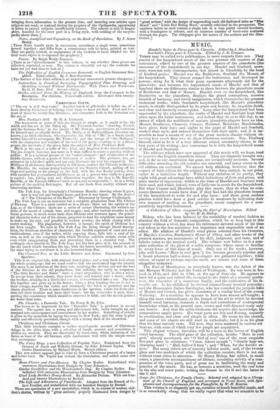A Collection of Glees, composedby the Earl of Merningion. Edited
by Sir H. R. Bishop.
Bishop, who has been induced by the mutability of musical fashion to abandon the field of dramatic composition, which he so long kept in this country without a rival, has since his retirement devoted much of his time and talent to the less ambitious but important and responsible task of an editor. His editions of Handel's vocal pieces selected from his Oratorios, of Haydn's Creation, Beethoven's Mount of Olives, and other works of the greatest masters, are monuments of his skill, judgment, and taste, and of infinite value to the musical world. The volume now before us is a com- plete collection of the glees of a noble composer, whose name is familiar to every lover of this class of music. Only one of his works, however, (the well-known "Here in cool grot,") has become generally popular, and is heard wherever half-a-dozen glee-singers are gathered together; while others, of equal or perhaps superior merit, are almost and some of them altogether unknown.
The Earl of Mornington, as everybody knows, was the father of the late Marquis Wellesley and the Duke of Wellington. He was born in Ire- land, in 1735, and died in 1781, at the age of forty-six. He appears to have led a quiet and retired life, occupied in the duties of a country gentle- man, the education of a numerous family, and the cultivation of his fa- vourite art. In his childhood he showed extraordinary musical precocity; and the Honourable Deities Barrington, who has recorded the juvenile feats of Mozart and Crotch, has given anecdotes of a similar kind of the young Wellesley. As a musician he appears to have been almost self-taught; a thing the more extraordinary, as the branch of his art to which he devoted himself; vocal harmony, demands a depth and correctness of contrapuntal knowledge which, in the general ease, severe and well-directed study only can bestow. And that the noble dilettante did acquire this knowledge, his compositions amply prove. His vocal parts are free and flowing, masterly in combination, and clear and simple in effect. He wrote for the church, and some of his chants are still used in cathedrals; but it is on his glees that his fame entirely rests. Till now, they were scattered in various col lections, with some of which very few people are acquainted.
This elegant volume, therefore, will be a boon to the lovers of English vocal harmony. The chief gems of the collection, besides "Here in cool grot," already mentioned, are "0 bird of eve," one of the most exquisite five-part glees in existence; "Come, fairest nymph "; "Gently hear me, charming maid"; "Hail, hallow'd fans "; and " When, for the world's re- pose." But many others are of scarcely inferior merit; and, of the twenty glees and two madrigals of which the collection consists, there is not one without some claim to attention. Sir Henry Bishop has added, in small notes, a pianoforte accompaniment ad libitum; consisting strictly of a com- pression of the voice parts, and of great use in facilitating the study and practice of the music. He has, as beseems a musician, used the real notes in the alto and tenor parts; writing the former in the G and the latter in the C clef.


























 Previous page
Previous page